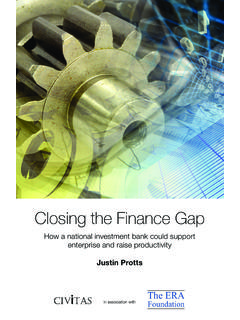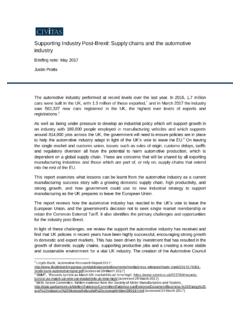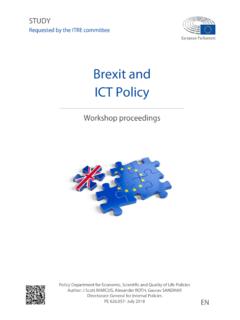Transcription of Implications of Brexit on the Digital Communications ...
1 1 Implications of Brexit on the Digital Communications sector Implications of Brexit on the Digital Communications sector | April 20172 Implications of Brexit on the Digital Communications sector Introduction The UK voted to leave the European Union membership on 23 June 2016. The process for exiting the EU formally started when Article 50 of the Lisbon Treaty was invoked by Government on 29 March 2017. The withdrawal process is due to last two years, during which the Government will start to negotiate the UK s new relationship with the EU and the rest of the world. The purpose of this paper is to provide insights into the challenges, risks and opportunities for the Digital Communications sector , understood here as comprising the telecommunication sector (provision and delivery of voice, data and video services) and the Digital content sector (industries delivering content services such as video, film, music, social media, TV) as technological convergence has blurred the boundaries between Digital content and telecommunication sectors.
2 As recognised in the Government s recent green paper Building our Industrial Strategy , connectivity is transformative for the future development of the UK economy. It lies at the heart of the Digital economy. Not only does the Digital sector deliver substantial economic growth on its own, it provides the foundations for our data driven economy. Over the last 20 years, the UK telecommunications sector has seen a radical change influenced by the convergence of technologies, leading to growth in consumer demand for ubiquitous internet access, data consumption, innovative online services and new technologies. Brexit has come at a critical time for the industry which is at the start of investment cycles targeted towards the deployment of ultrafast connections and the move towards 5G connectivity. For the industry to continue to invest in the UK in the years to come, and maintain the UK s place as a leading Digital nation , mitigating risks associated with the UK leaving the European Union should a key objective for Government.
3 As underlined by Government in its White Paper on the UK s objectives in negotiating the exit and new partnership with the EU , the Digital Communications industry needs to continue to operate in the UK and abroad under the most favourable scale of any challenges or opportunities post Brexit will vary depending on the future alternative models of collaboration with the EU and the rest of the world. The UK has integrated over 40 years of regulation, benefited from access to the EU Single Market and developed trading relationships with the rest of the world via the EU. Whilst this paper is not aimed at presenting solutions to the key issues that will arise as negotiations start with EU institutions and affect the telecoms sector , it provides Government with an overview of the sector s preferred approach for the upcoming negotiating period. The aim of this paper is to answer the following questions: How engrained is the EU Regulatory Framework for Communications in the UK system?
4 Both in terms of legislation and at an institutional level? What could be the impact for the industry on the possibility to provide services in the UK, EU and internationally from a regulatory perspective? Is it preferable to retain and continue alignment with the EU Regulatory framework and other EU telecoms policies? What would be the Implications of Brexit on the industry with regard to its ability to provide services in the EU market and internationally? What are the opportunities?According to the European Commission, the UK has the largest telecoms services sector in the EU. It accounts for of the EUR of value added by the sector across the EU281 HM Government Building our Industrial Strategy - 2 The UK compares positively in the EU with regard to its performance in delivering connectivity to businesses and consumers, in encouraging take-up of internet access services and placing the UK in the first rank for E-commerce in the EU - 2016 Digital Economy & Society Index Research published in 2015 from the Boston Consulting Group found that the UK internet economy is the largest of the G-20 countries as percentage of GDP - The Government Department for Exiting the European Union published a White Paper on 2 February 2017.
5 States that With respect to Communications networks, telecoms operators are regulated in the UK by the EU s Electronic Communications Framework , which promotes competition and choice. As we exit the EU, we will want to ensure that UK telecoms companies can continue to trade as freely and competitively as possible with the EU and let European companies do the same in the UK. According to Government, the UK telecoms industry contributes to billion to the UK economy. The Digital industry , which relies in great part on telecoms services, contributes to billion to the economy (16% of the UK economy).3 Implications of Brexit on the Digital Communications sector Executive summary The Digital Communications sector has reached another inflection point as we look to upgrade to the next generations of fixed and wireless technologies. Creating and maintaining a favourable environment for sustainable investment in Digital infrastructure now and in the years to come will be crucial for the UK economy.
6 It is difficult to anticipate or quantify the Implications that Brexit will have on the UK Digital Communications industry as a whole, but Government can play a key role in supporting the industry by minimising risks to investment and innovation, and creating opportunities for the industry to continue to compete globally. Changes to the regulatory regime covering the Digital Communications sector represent an important risk for the industry . The majority of Digital communication services are delivered and regulated at national level. The diversity of services delivered across the broadband value chain ( audio-visual media services, mobile roaming charges, etc.) means that a number of services are delivered at cross-border level and regulated at EU level. This is also the case for the free flow of data which underpins the Digital economy. A significant proportion of Ofcom s powers and duties under the Communications Act 2003 derive from the EU Regulatory Framework for Communications , which is currently under review.
7 The timing of the revision of the rules governing the sector , combined with proposals of a Digital Single Market seeking to remove obstacles to the provision of Digital services across the Union leads to uncertainty as to how services will be regulated after Brexit . This in turn could impact on consumers at the retail level. The trade in electronic components and telecoms equipment represent a critical portion of the telecom companies operations. It is vital for the industry as it supports the development of networks and innovative communication technologies. It is at risk of being affected by the change of relationship between the UK, the EU and the rest of the world. Changes to trading relationships also have the potential to create new opportunities for the industry . The UK is and will continue to be measured globally with regard to its connectivity levels and adoption by users of new technologies. The UK needs to retain its capacity to attract investors, Digital innovators and high growth companies.
8 The end of free movement of people between the EU and the UK is likely to impact on the capacity for the industry to attract talent and resources needed to not only operate effectively but also compete at global level. 4 Implications of Brexit on the Digital Communications sector Milestones in the process of exiting the EU and EU legislative developments Risks and opportunities for the industry will emerge and develop as the process of exiting the EU takes place. The grid below illustrates the key milestones of the Brexit process and concurrent legislative developments at EU level which will have a direct impact on the Digital Communications industry . Recommendations below have been developed for the short, medium and long term in reference to the Brexit termShort termEU Regulatory changesMid-2017 EU General Data Protection Rules start to apply in the UK EU rules on the abolition of roaming charges are in force in the UK and the rest of the EU Negotiations on a European Electronic Communications Code (EECC) continue in EU institutions EU Regulation on cross-border portability of content come into force in the UK Mid to end 2017 Conclusion of the review of EU Audio-visual media services Directive and start of the transposition process Start of 2018 Expected deadline for the adoption of the EECC, and start of the transposition at national level (typically 18 months)
9 Long termBrexit process29 March 2017 Article 50 is triggered, marking the start of the process of negotiation for a withdrawal agreement 29 April 2017 EU agree Article 50 Negotiation GuidelinesBy end of March 2019 Negotiations for a withdrawal agreement end the UK ceases to be a member of the EU Negotiations for the framework setting the new relationship between the UK and the EU continue Existing EU law is converted into UK law via the Great Repeal Bill opportunities to amend or repeal elements of the acquis communautaire 5 Implications of Brexit on the Digital Communications sector Recommendations for Government Avoiding a cliff-edge Brexit It is important for the sector that the process of exiting the EU is as smooth as possible. This means exiting the EU and agreeing the terms of its future trading and collaborative relationship as early as possible. A cliff-edge scenario, whereby the terms of the transition deal or a trade agreement between the UK and the EU are not secured, would further the concerns of the industry over the regulatory, economic and trade environment under which businesses operate.
10 Alignment with the EU regulatory framework for the medium term The UK s national regulatory regime is derived from the EU Telecoms Framework which is currently under review. We support the Government s commitment to taking part in and influencing the ongoing negotiations. In the short and medium term, industry expects that the UK telecoms regulations will remain aligned with overall EU regulatory framework to provide legal and commercial certainty during the transition period. The UK should seek to align the UK rules with the EU regulatory framework in the medium term. Government may see benefits in diverging from the EU on aspects of the framework in the longer term and industry stands ready to engage on any such proposals through Government consultation. Difficulties in implementing EU rules post- Brexit could however arise in the context of the regulation of cross-border services where cooperation with other regulatory bodies will be necessary.










